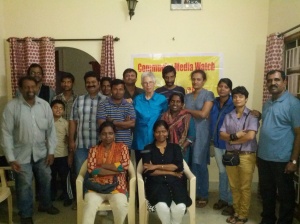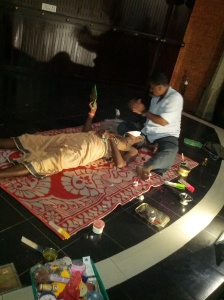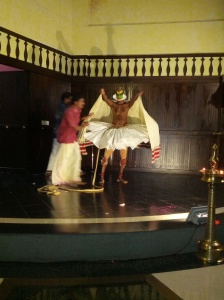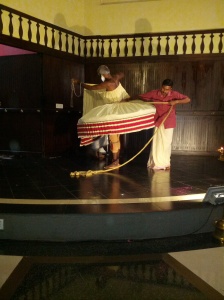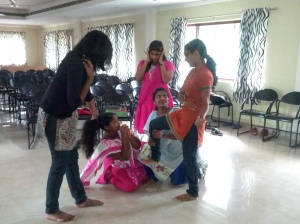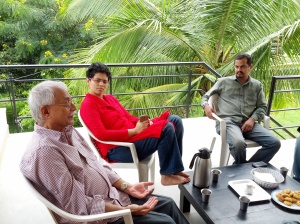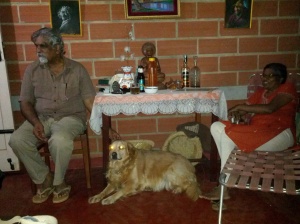Hello to All! On Nov. 7 I delivered the Kappen Memorial Lecture in downtown Bangalore, a yearly event done by Visthar [the NGO I am volunteering with]. The lecture commemorates the life and work of Sebastian Kappen who was a Jesuit priest here in India, and a radical one at that. He died in 1993, but left behind a legacy of living with and working in the midst of the poor. He also wrote many books and was on the “to be silenced” list of JPII had Kappen not died. He often spoke of releasing Jesus from the constrictions that have been placed on him by the church. Truly I have encountered in his writings a brother. And so it was an honor to give this memorial lecture.
Amazingly enough, I am the first non-Indian person to give this lecture, and the 16th person to give it [Vandana Shiva is one of the former presentors]. My forty minute talk focused on theatre and feminist theologies as arenas in which to dream and rehearse trans-formation and trans-figuration. Justice. [built on Boal’s phrase: the theatre is a rehearsal for revolution]. There were approximately 150 people present and from all walks of life.
I have some pretty wonderful pictures of this event, as well as pictures from the previous post on this blog—and can you believe it, the server here at Visthar will not upload them. I am eager to show them to you….and will put them up as soon as possible.
****************************************
Saturday, Nov. 7:
Again, no pics uploaded, but the SECOND ECUMENICAL EUCHARIST this morning, Saturday, at 11:30am. Some 30 people in a lovely large circle with a table in the middle in an outdoor space here at Visthar completely surrounded by beautiful fruit trees. A perfect place to celebrate a Mass of Women Mystics: from Mira Bai, to Hildegard of Bingen to Sufi women mystics! On the table were also beautiful “dolls” made by Francoise Bosteels showing a boy, Ravi, searching through garbage for food, a woman on her back, sari torn away, raped….and a woman holding the cup/chalice and a man the bread [women shedding their blood and sharing their life blood for the life of the world]. [ http://francoisebosteels.blogspot.in/ ]
We used chappati for bread, a flat round freshly made chappati…..and water so precious, so part of us. Our liturgy as usual de-centered the priest, and instead raised up the voices of all present as leaders of the liturgy. The comments afterward were rather extraordinary: ‘I am Catholic and I always have a hard time at Mass because it is so controlled by the priest….but this had all of us involved and participating;” “We are going to have more Eucharists like this one now and new ones that we want to dream up, maybe an actual meal next time…” “You know, worship in India prior to colonization was very free….but when the West came it became so stilted and stiff….this Eucharist today didn’t feel like that, it was free.”
Perhaps the most moving thing said to the whole group at the end of our Eucharist was by a young girl named Aruna. “Today” she said “I received my first communion and I am so happy!” Her mother was beaming next to her. Evidently she had asked her mother as the chappati was being passed around the circle and we were all feeding each other–may I?–and her mother had said “yes.” Oh how wonderful this was, we all laughed and clapped and hugged her. And of course I have a wonderful picture of her, but cannot upload it dear friends!!!!! Soon I hope.
Continuing our Eucharist we all shared a lovely lunch provided by Visthar.
********************************
This afternoon, at 3pm I visited “Liza’s Home”…..and KC and Molly Abraham [he is a retired, well-known Indian theologian, an authority on Third World theology, a Marxist scholar and propounder of the theory of “liberative solidarity”…..and she a retired medical doctor]. Their son, Ajit, was the person who gave me the idea of coming and volunteering with Visthar. Ajit teaches in Global Studies at CSU Monterey Bay, the same department that Kathryn [my spouse!] chairs. KC and Molly’s daughter, Liza, is mentally and physically disabled/differently abled. Molly started this home for her and for other women who are differently abled. There are 24 women there. Pictures to follow.
KC has been ill. He is 75. He spoke of the feeling of vulnerability, being fragile….but at the same time said he felt fearless because of what he believes will happen after death. It was a very beautiful conversation, peace-filled….but also probably difficult for his wife Molly, who also sat with us.
*****************************
Returning from my visit, I spent an hour with a Minnesota student who is part of Concordia College’s semester in India, part of which is spent at Visthar. She wanted to speak about faith and what it is…..and what it means for me to call myself a Catholic. Her mother is Catholic, but does not practice. She wants to be a social worker and will spend next semester working on a Native American reservation in North Dakota.
TOO BED DEAR FRIENDS!!











